Daily Current Affairs and GK | 12 September 2020

Main Headlines:
- 1. Declaration of Results of 2nd edition of Ranking of States on Support to Startup Ecosystems.
- 2. Climate Smart Cities Assessment Framework (CSCAF) 2.0 launched.
- 3. 125th Birth Anniversary of Acharya Vinoba Bhave: 11 September.
- 4. Government constitutes Empowered Group of Ministers headed by Defence Minister.
- 5. Aero India 21 website launched by Defence Minister.
- 6. Bahrain agrees to normalize relations with Israel.
- 7. United Nations Day for South-South Cooperation: September 12.
- 8. Reserve Bank of India issues guidelines for appointment of CCO in banks.
- 9. Swami Agnivesh passes away at ILBS, New Delhi.
- 10. Methane hydrate deposits in KG basin richer source of biogenic methane.
Happy February get 35% Off
Use Coupon code FEB26
1. Declaration of Results of 2nd edition of Ranking of States on Support to Startup Ecosystems.
- The results of the 2nd edition of Ranking of States on Support to Startup Ecosystems have been declared.
- The results were announced by the Minister of Commerce and Industry Piyush Goyal.
- Department for Promotion of Industry and Internal Trade (DPIIT) has carried out States’ Startup Ranking Exercise in which 22 states and 3 UTs participated.
- The States’ Startup Ranking Framework 2019 consists of 7 broad reform areas with 30 action points, including Institutional Support, Easing Compliances, Relaxation in Public Procurement norms, Incubation support, etc.
- During the ranking process, States and UTs have been divided into two groups. Category ‘Y’ has UTs except for Delhi, and all States in North East India, except Assam. Category ‘X’ has all other states and UT of Delhi.
- States Startup Ranking Results 2019 are as follows:
- Category X:
- Best Performer: Gujarat
- Top Performers: Karnataka and Kerala
- Leaders: Bihar, Maharashtra, Odisha, Rajasthan
- Aspiring Leaders: Haryana, Jharkhand, Punjab Telangana, Uttarakhand
- Emerging Startup Ecosystems: Andhra Pradesh, Assam, Chhattisgarh, Delhi, Himachal Pradesh, Madhya Pradesh, Tamil Nadu and Uttar Pradesh
- Category Y:
- Best Performer: Andaman and Nicobar Islands
- Leader: Chandigarh
- Aspiring Leader: Nagaland
- Emerging Startup Ecosystems: Mizoram and Sikkim
- Leaders across 7 Reform Areas:
- Institutional Leaders: Karnataka, Kerala, Odisha
- Regulatory Change Champions: Karnataka, Kerala, Odisha, Uttarakhand
- Procurement Leaders: Karnataka, Kerala, Telangana
- Incubation Hubs: Gujarat, Karnataka, Kerala
- Seeding Innovation Leaders: Bihar, Kerala, Maharashtra
- Scaling Innovations Leaders: Gujarat, Kerala, Maharashtra, Rajasthan
- Awareness and Outreach Champions: Gujarat, Maharashtra, Rajasthan
- Category X:
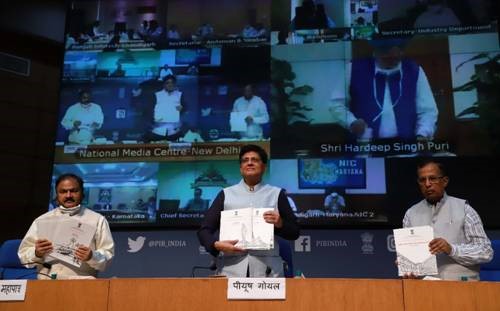
(Source: PIB)
2. Climate Smart Cities Assessment Framework (CSCAF) 2.0 launched.
- The Climate Smart Cities Assessment Framework (CSCAF) 2.0 was launched by the Minister of Housing and Urban Affairs Hardeep Singh Puri.
- CSCAF aims to provide a roadmap to cities in combating climate change during the planning and implementing various actions.
- CSCAF will help in building Climate-Sensitive Approach towards Urban Planning and Development.
- CSCAF has 28 indicators across five categories:
- Energy and Green Buildings
- Urban Planning, Green Cover & Biodiversity
- Mobility and Air Quality
- Water Management
- Waste Management
- The Climate Centre for Cities under National Institute of Urban Affairs (NIUA) is supporting MoHUA in the implementation of this framework. NIUA has established the Climate Centre for Cities with support from MoHUA.
- He also launched ‘Streets for People Challenge’. This is an initiative of Smart Cities Mission and will help in making cities more walkable and pedestrian-friendly. It aims to encourage cities to make walking-friendly streets through low cost and innovative methods.
- Fit India Mission (Ministry of Youth Affairs and Sports) and the India program of the Institute for Transport Development and Policy (ITDP) have collaborated with the Smart Cities Mission to support this challenge.
- National Institute of Urban Affairs (NIUA):
- It is the leading national think tank on urban planning and development in India.
- It is located in New Delhi.
- It was established in 1976.
- Director: Mr. Hitesh Vaidya
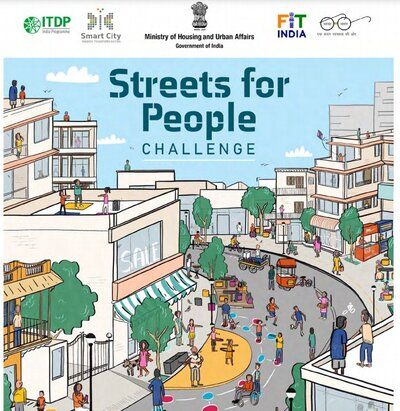
(Source: MoHUA)
3. 125th Birth Anniversary of Acharya Vinoba Bhave: 11 September.
- Acharya Vinoba Bhave was born on 11 September 1895 in the Bombay Presidency, and this year marks his 125th Jayanti.
- Vinoba Bhave was the founder of the Bhoodan Movement.
- He started the Sarvodaya Movement.
- He was an advocate of non-violence and human rights.
- Gandhi chose him as the first individual Satyagrahi in a non-violent movement in 1940.
- He was honoured with Ramon Magsaysay Award in 1958 and Bharat Ratna in 1983 (posthumously).
- The day also marks the 127th Anniversary of Swami Vivekananda’s Chicago address (1893).
- This year also marks the 19th anniversary of 11 September 2001 terrorist attacks in US.
4. Government constitutes Empowered Group of Ministers headed by Defence Minister.
- The government has constituted an Empowered Group of Ministers (EGoM) that will be headed by Defence Minister Shri Rajnath Singh.
- The EGoM will oversee and guide the conversion of Ordnance Factory Board (OFB) into one or more than 100% government owned corporate entities.
- Other ministers in the EGoM are:
- Home Minister Shri Amit Shah
- Finance Minister Smt Nirmala Sitharaman
- Minister for Law & justice Shri Ravi Shankar Prasad
- Minister of State for Labour & Employment Shri Santosh Kumar Gangwar
- Minister of State for Personnel, Public Grievance & Pension Dr Jitendra Singh
- M/s KPMG Advisory Services Pvt. Ltd. (Lead Consortium Member) with M/s Khaitan & Co. Ltd. as another Consortium Member, have been selected as the Consultancy Agency for providing consulting services.
- Ordnance Factory Board is a defence contractor owned by the government of India. It was established in 1712. Its headquarters is located in Kolkata.
5. Aero India 21 website launched by Defence Minister.
- Defence Minister Rajnath Singh launched the Aero India 2021 website aeroindia.gov.in to allow space booking.
- Aero India:
- It is a biennial air show held at Air Force Station, Yelahanka, Bengaluru, Karnataka.
- It is organized by the Defence Exhibition Organisation, Ministry of Defence.
- Aero India 21 is the 13th edition of Aero India will be held from 3rd to 7th February 2021.
- The first edition was held in 1996.
- It is the Asia’s largest Aeroshow.
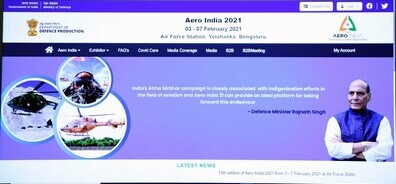
(Source: PIB)
6. Bahrain agrees to normalize relations with Israel.
- Bahrain has become the latest Arab nation to normalize relations with Israel after being pushed by US.
- The leaders of US, Israel and Bahrain held a three-way phone call and also issued a brief six-paragraph joint statement.
- Before Bahrain, UAE became the third after Egypt and Jordan to normalize relations with Israel.
- Bahrain:
- It is a country in the Persian Gulf.
- Capital: Manama
- Currency: Bahraini Dinar
- Prime Minister: Khalifa Bin Salman Al Khalifa
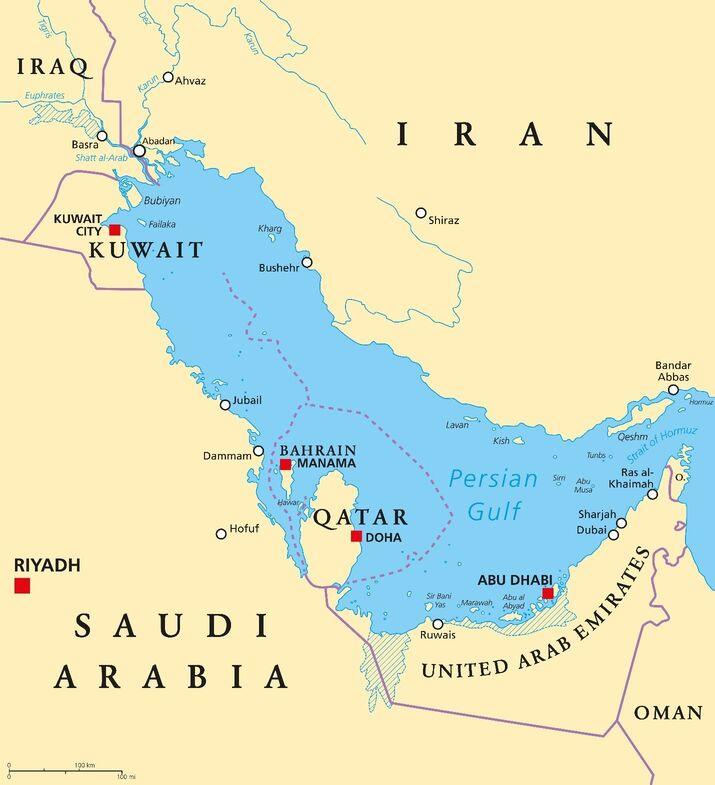
7. United Nations Day for South-South Cooperation: September 12.
- It is celebrated annually to mark the adoption of the Buenos Aires Plan of Action for Promoting and Implementing Technical Cooperation among Developing Countries (BAPA) in 1978.
- United Nations Day for South-South Cooperation celebrates economic, social and political developments made by the regions and countries of the South.
- It highlights UN efforts to work on technical co-operation among developed countries.
- Theme 2020: “Pathways toward the SDGs through South-South solidarity beyond COVID-19”
8. Reserve Bank of India issues guidelines for appointment of CCO in banks.
- RBI has issued Compliance Functions in Banks and the Role of Chief Compliance Officer (CCO) guidelines for bringing uniformity in diverse practices followed by banks.
- The guidelines say that banks should have a compliance policy approved by the board and reviewed at least once in a year.
- As per the guidelines, banks should appoint Chief Compliance Officer (CCO) for a minimum fixed tenure that should not be less than three years.
- Guidelines also provide eligibility criteria for the appointment of CCO. CCO should have experience of 15 years in banking or financial services.
- Out of a total 15 years of experience, 5 years of experience should be in any of the functions provided in guidelines. The experience should be in Audit / Finance / Compliance / Legal / Risk Management functions.
- As per the guidelines, banks should report appointment, transfer, and removal of CCO to the Department of Supervision in RBI’s Central Office in Mumbai.
- The selection of CCO should be based on a well-defined selection process and recommendations made by the senior executive-level selection committee constituted by the board for the purpose.
9. Swami Agnivesh passes away at ILBS, New Delhi.
- On 11 September, Swami Agnivesh passed away at the Institute of Liver and Biliary Sciences (ILBS) in New Delhi.
- He served as MLA and Cabinet Minister for Education in Haryana.
- He is known for his work against bonded labour and alcoholism.
- He founded Bandhua Mukti Morcha (BMM) or Bonded Labour Liberation Front (BLLF) in 1981.
- He worked as president of Sarvadeshik Arya Pratinidhi Sabha, World Council of Arya Samaj.
- Arya Samaj:
- It was founded by Swami Dayanand Saraswati on 10 April, 1875.
- Its members believe in one God and the authority of vedas.
- It was mainly active in Punjab and worked to revive Vedic learning and mix it with modern education in sciences.
- It worked to return people back to Hinduism, who earlier converted to Islam.
- Its founder, Swami Dayanand Saraswati, supported widow remarriage.
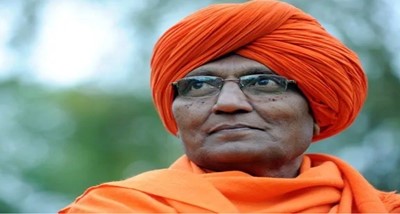
(Source: News on AIR)
10. Methane hydrate deposits in KG basin richer source of biogenic methane.
- Methane hydrate deposits in the KG basin will be richer source of biogenic methane than the Andaman and Mahanadi basins because a study by Agharkar Research Institute (ARI) has shown that the KG basin has maximum diversity of methanogenic bacteria.
- The study carried out by ARI, an autonomous institute of DST, has also shown that methane hydrate deposits in Krishna-Godavari (KG) basin are of biogenic origin (produced by living organisms).
- The study also shows that the KG basin has Methanosarcina, Methanoculleus and Methanobacterium. But, Methanosarcina is more diverse than the other two genera (groups).
- One cubic meter of methane hydrate can produce 160-180 cubic meters of methane. It is estimated that methane hydrates in KG Basin are twice that of all fossil fuel reserves available worldwide.
- Krishna Godavari Basin is located in Andhra Pradesh and nearby areas of Bay of Bengal. It is famous for the D-6 block, where India’s biggest natural gas reserves were found by Reliance in 2003. The depositions in the basin range from Late Carboniferous to Pleistocene.





 11 September 2020 Current Affairs
11 September 2020 Current Affairs 








Comments